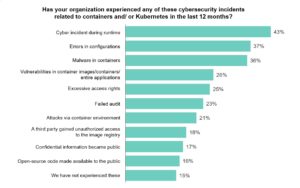More than three quarters (85%) of geo-distributed companies in the Middle East, Turkiye and Africa (META) region using container development methods experienced cybersecurity incidents in the last 12-months, according to the latest Kaspersky study. These organisations, who used containers and/ or Kubernetes, faced a wide range of cyber incidents with results including confidential data leaks (38%), financial losses (28%), and decreased customer trust (38%).
RELATED: Cybersecurity and cybercrime: Understanding the rising threat and Its impact
In its latest study titled “Managing geographically distributed businesses: challenges and solutions”, Kaspersky gathered the opinions of IT Security, Information Security professionals, and C-level decision makers from 20 countries working for geo-distributed companies regarding network security challenges in building and maintaining multi-site infrastructure. The study also highlights the problems these organisations face when operating in hybrid cloud and containerised environments.
The vast majority (98%) of the companies in the META region with multi-site networks participating in the study, had in-house IT development teams, with 79% of them using a container development method. Of those using container methods, 85% reported experiencing cybersecurity incidents related to containers and/ or Kubernetes in the last 12 months.
Consequences were severe
The consequences of the cyber incidents experienced by these companies were severe: 38% of them led to confidential data leaks, 28% caused financial losses, and 38% resulted in the loss of customer trust. Respondents reported the primary reasons for the attacks were errors in configurations (37%), flaws in runtime security process (43%), and late detection of malware in containers (36%).

“Cybersecurity incidents related to containers and Kubernetes present significant challenges for geo-distributed companies. The findings from our study underscore the critical importance of implementing robust security measures to safeguard against confidential data leaks and other cyberthreats in hybrid cloud and containerised environments. As organisations continue to expand their digital footprint, proactive security measures are essential to mitigate risks and maintain customer trust,” says Timofey Titkov, Head of Cloud & Network Security Product Line, Kaspersky.
To protect containerised environments, Kaspersky recommends using specialised solutions, such as Kaspersky Container Security, designed to ensure security across all stages of containerised application development. This can serve as the initial step in implementing complex DevOps and cloud security solutions, like the forthcoming Kaspersky Cloud Workload Security. The ecosystem provides customers’ cloud infrastructure with comprehensive protection covering hosts, virtual machines, instances in clouds, containers and Kubernetes. Additionally, it reduces costs and resource consumption.
The full report with more findings on the challenges facing geo-distributed companies is available via this link.

































